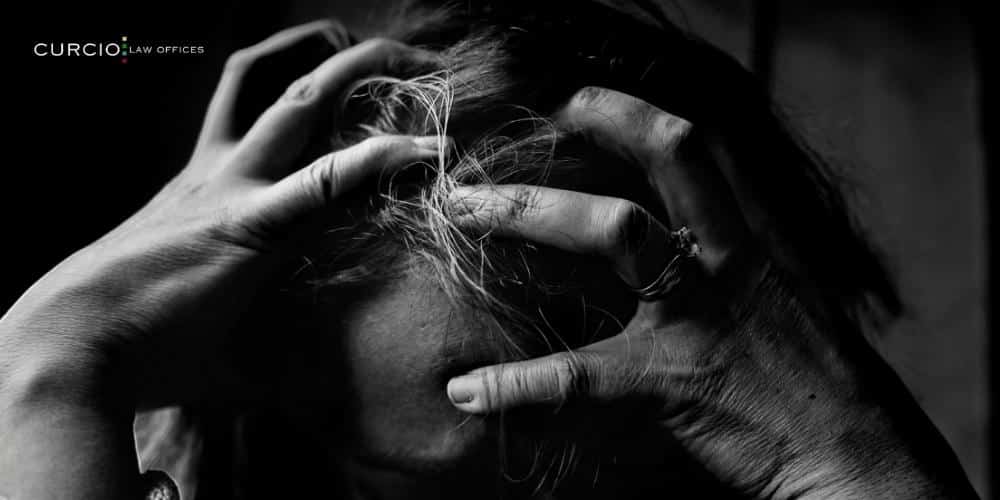CHICAGO EMOTIONAL DISTRESS LAW FIRM
PRACTICE AREAS
Our Chicago emotional distress law firm regularly handles claims stemming from nursing home emotional abuse, psychological trauma in behavioral care centers, and psychiatric centers throughout Cook County. Emotional distress plays a role in most personal injury claims, but most people don’t realize that you can file a lawsuit for mental distress in Illinois.
Mental health is just as important as physical health, and oftentimes, mental and physical health directly influence each other. Traumatic accidents can ruin a person’s life emotionally, just like they can physically. Our Chicago emotional distress lawyer team helps victims recover financial compensation for such suffering.
Our Chicago emotional distress attorneys help emotionally traumatized victims recover damages for medical bills, counseling bills, lost wages, and more. Call 312-321-1111 to schedule a free consultation with an experienced injury lawyer in Chicago, IL, today.
Why Choose a Chicago Emotional Distress Lawyer From Curcio & Casciato
Clients throughout Cook County choose our Chicago emotional distress law firm because our legal team knows how to prove the full impact of psychological harm under Illinois law. Our emotional distress attorneys have decades of experience building strong cases for victims suffering from severe anxiety, depression, post-traumatic stress disorder, and other conditions caused by negligence or intentional misconduct. We handle every case on a contingency-fee basis, so you pay no fees unless we secure a fair settlement or jury award.

Understanding Emotional Distress Claims in Illinois
Can you make a claim for PTSD in Chicago?
Emotional distress is when someone suffers severe mental and emotional health issues, often following a traumatic event. Many emotionally distressed people can also experience physical symptoms and pain. Long-term, intense mental anguish can manifest as disorders such as:
- Post-traumatic stress disorder (PTSD)
- Panic disorder
- Generalized anxiety disorder
- Social anxiety disorder
- Agoraphobia
- Separation anxiety
- Obsessive-compulsive disorder (OCD)
- Major depressive disorder
Intentional Infliction of Emotional Distress Illinois
Intentional Infliction of Emotional Distress (IIED) is a type of tort that occurs when someone commits a horrendous act in order to intentionally cause psychological injuries. An example of an intentional act would be threatening someone with a major physical injury or wrongful death.
Certain elements must be present in a mental anguish claim in order to qualify as Intentional Infliction of Emotional Distress. In general, the defendant’s actions were intentional infliction and caused major emotional trauma or serious injury to the victim. Any reasonable person would suffer due to the intentional or grossly negligent infliction.
If you’re suffering emotionally after a traumatic incident and you meet this criteria, Chicago personal injury attorneys for infliction of emotional distress can help you. Obtaining justice and recovering compensation after the negligent infliction of emotional trauma can feel overwhelming, especially without legal counsel. Allow an experienced Chicago accident lawyer at Curcio & Casciato to take on your case and help you claim compensation.
If your loved one died as a result of this, contact a Chicago wrongful death attorney at Curcio & Casciato.
Emotional Distress Claims vs. IIED
These are different types of cases. The first is generally connected to physical injuries. Meanwhile, a physical injury may not be present in an IIED claim. That’s because, in an IIED claim, the defendant’s conduct may not have been physical. Intentional or grossly negligent infliction claims often entail threats or warning signs of harm, harassment, emotional manipulation, gaslighting, or even performing acts of violence on someone else in front of the victim.
You will need strong legal representation from a Chicago emotional distress lawyer for both types of claims.
Negligent Infliction of Emotional Distress Illinois
Negligent Infliction of Emotional Distress (NIED) occurs when a person suffers serious emotional harm because another person didn’t use reasonable care, even if there was no intent to cause distress.
For a successful NIED claim, victims generally must prove a duty of care, breach of that duty, and a direct link between the other person’s negligence and the emotional harm.
This differs from Intentional Infliction of Emotional Distress (IIED), which requires showing that the defendant’s conduct was extreme and outrageous, done intentionally or with reckless disregard, and directly caused severe emotional distress.
Post-Traumatic Stress Disorder (PTSD) Claims
Under Illinois law, post-traumatic stress disorder (PTSD) can be the primary injury in a standalone emotional distress claim when the PTSD is caused by another party’s intentional or negligent conduct.
Common triggers include violent assaults, sexual abuse, catastrophic accidents, serious threats, or witnessing a loved one’s injury or death.
For negligent infliction of emotional distress claims, Illinois applies the “zone of danger” rule. This requires the plaintiff to have been at immediate risk or to have been a close family member of a victim.
For intentional infliction of emotional distress claims, the conduct must be extreme and outrageous.
For both claims, medical evidence is essential, as mental health professionals link the PTSD diagnosis to the event.
Common Symptoms of Emotional Distress

Uncontrollable crying
Panic attacks
Intense fear and anxiety
Depression and hopelessness, little to no self-worth
Substance abuse (including prescription medications and alcohol)
Intrusive/suicidal thoughts, self-harm
Emotional numbness (dissociation/derealization episodes)
Neglecting basic self-care
Difficulty concentrating, struggling to go to work/school or perform daily tasks
Social withdrawal (avoiding certain people, places, situations, etc., no interest in enjoyable activities, rarely ever leaving the bed or the house)
Memory loss
Flashbacks
Jumpiness or strong reactions
Sleeping problems (nightmares, chronic fatigue)
Intense emotions, mood swings, rumination
Physical symptoms, such as tense or sore muscles, elevated heart rate, heart palpitations, hyperventilation, GI problems (nausea, vomiting, diarrhea, constipation, lack of appetite), frequent headaches, skin rashes and hives, sexual dysfunction
Emotional health issues like these are often just as serious as physical injuries because they can severely disrupt every aspect of someone’s life. Family members, friends, and partners of emotionally distressed people can also suffer just from seeing their loved one in so much pain.
Chicago emotional distress attorneys at Curcio & Casciato recognize the severity of psychological injuries. We want to help victims restore their lives to their pre-accident state with fair compensation and justice by pursuing economic damages and non-economic damages in civil court.
Major Accidents and Traumatic Incidents That Can Lead to Severe Emotional Distress
Common examples of traumas that can lead to both psychological and physical injuries include:
Auto Accident Trauma in Cook County
Car Accident PTSD and Anxiety
Motor vehicle accidents can leave lasting psychological effects. Many car crash survivors develop PTSD or anxiety that disrupts daily life. Symptoms can include flashbacks, panic attacks, and a fear of driving or riding in vehicles. Our Chicago car wreck lawyers can help pursue full compensation on behalf of victims throughout Cook County.
Public Transportation Accident Trauma
Chicago public transportation accidents often cause significant emotional trauma, even for passengers who escape without serious physical injuries. A sudden collision, derailment, or onboard incident can cause lasting anxiety, panic attacks, or post-traumatic stress disorder that interferes with work, travel, and everyday activities.
A Chicago bus accident lawyer can help document the psychological harm caused by a traumatic crash and seek compensation for counseling, lost wages, and diminished quality of life.
When the incident involves the CTA, a CTA accident attorney can navigate the unique legal requirements for claims against public transit authorities.
Victims of train incidents or derailments may turn to a Chicago train accident lawyer to pursue recovery for mental health treatment, emotional suffering, and other related losses.
Pedestrian Accident Psychological Injuries
Pedestrian accidents often result in serious psychological injuries. Survivors may develop PTSD, depression, or anxiety, triggered by the sudden impact and vulnerability experienced during the event. Our Chicago pedestrian injury lawyers can work to prove the extent of the psychological damage and recover compensation on behalf of victims.
Bike Accident Trauma
A Chicago bicycle accident lawyer can help victims recover compensation for counseling, lost wages, and the pain and suffering tied to psychological injuries. When a collision results from a motorist opening a car door into a cyclist’s path, a Chicago dooring accident lawyer can pursue claims for the emotional and mental health impacts in addition to any physical injuries.
Cook County Medical Malpractice Emotional Distress
Victims of medical malpractice endure not only physical harm but also significant emotional turmoil. A Chicago medical malpractice attorney can offer crucial support to those affected by negligence.
Surgical Error Psychological Trauma
The fear of future procedures, loss of trust in healthcare providers, and ongoing emotional distress can significantly impact daily life. A Chicago surgical error lawyer can gather medical and psychological evidence to demonstrate the full scope of the harm and pursue compensation for therapy, lost income, and the pain and suffering linked to the emotional aftermath of the mistake.
Misdiagnosis Emotional Consequences
Patients may experience anxiety, depression, or loss of trust in medical providers after learning their condition was misunderstood or overlooked. A Chicago medical misdiagnosis lawyer can investigate medical records, consult expert witnesses, and seek compensation for therapy, lost wages, and the emotional suffering caused by the diagnostic error.
Hospital Negligence Mental Anguish
Hospitals are expected to provide safe, competent care, but negligence within these facilities can result in serious psychological harm in addition to physical injury. Patients may suffer trauma from medical errors, neglect, or mistreatment, leading to anxiety, depression, or post-traumatic stress that affects long-term well-being. A Chicago hospital malpractice attorney can investigate the circumstances, obtain expert medical opinions, and help recover malpractice settlements.
Birth Injury Family Emotional Distress
Birth injuries can cause immense emotional distress for families, as the joy of welcoming a child is replaced by fear, uncertainty, and the challenges of caring for an injured newborn. Parents experience a range of emotions while coping with the medical needs of their child and the impact on family life.
Our Chicago birth injury attorneys can work to prove the full extent of emotional and financial harm and pursue compensation to support both the child’s care and the family’s psychological recovery.
Abuse in Psychiatric or Behavioral Care Centers
Abuse causes severe emotional distress for patients who are already vulnerable due to mental health conditions. Our Chicago psychiatric malpractice lawyers can investigate facility records, interview witnesses, and work with mental health experts to prove the harm caused, seeking compensation for therapy costs, lost wages, and pain and suffering tied to the abuse.
Cook County Nursing Home Emotional Distress
Emotional distress in nursing homes can result from verbal abuse, humiliation, isolation, or neglect that robs residents of dignity and security. Such mistreatment can lead to depression, anxiety, withdrawal, and a decline in overall health. A Chicago nursing home emotional abuse lawyer can investigate staff conduct, gather witness statements, and seek compensation for the psychological harm and related losses on behalf of nursing home residents.
Cook County Claims for Emotional Distress in Children
The emotional scars left by child abuse or negligence are deep and long-lasting, requiring the expertise of a Chicago child injury lawyer to navigate the sensitive legal landscape.
Child Abuse or Neglect
Chicago school injury lawyers play a pivotal role when abuse or negligence occurs within educational settings, providing a safe avenue for justice and healing.
A Chicago daycare injury lawyer serves a similar role for cases involving harm in childcare facilities, addressing both physical injuries and the emotional distress young children may suffer.
Sexual Abuse or Exploitation
Cases of sexual abuse, particularly involving children, are among the most harrowing, with victims often experiencing physical injury along with severe anguish that can affect them well into adulthood. Legal intervention in these cases is not just about seeking justice but also about facilitating the path to emotional recovery for the young victims.
Contact a Chicago sexual abuse injury lawyer to learn more.
Juvenile Detention Center Abuse
Our Cook County juvenile detention center abuse lawyers work with families whose children are living with deep emotional scars after enduring sexual assault, physical violence, and systemic neglect inside Illinois detention facilities. The trauma often manifests as nightmares, severe anxiety, withdrawal from loved ones, and a loss of trust in authority figures.
We can also help file a lawsuit against Timberline Knolls for survivors who developed profound psychological distress after staff sexual abuse and neglect in its care.
Trauma Caused by Dog Bites
Victims, particularly children, may develop post-traumatic stress, anxiety around animals, and recurring nightmares that disrupt daily life. A Chicago dog bite lawyer can document these psychological effects, work with medical and mental health experts, and pursue compensation for therapy, lost income, and the pain and suffering caused by the attack.
If someone else’s negligence caused one of the aforementioned incidents – and you have suffered a physical injury and/or mental anguish as a result, you deserve quality representation. A Chicago emotional distress lawyer from our legal team may be able to help you.
Suing for Emotional Distress in Illinois
You can sue for emotional distress if someone else’s negligent actions or inactions directly caused the damage. In fact, the average personal injury lawsuit will often provide compensation for the emotional trauma associated with the personal injury.
The main challenge in an emotional distress claim is proving that the victim’s emotional distress is real, valid, and worth compensation. This is obviously a bit more difficult than proving that physical injuries are real and valid. Someone who is physically injured has obvious wounds, disfigurement, and/or disability. Emotional distress and mental illness are often “invisible” but still very real and valid. So, in order to prove emotional distress, you need an experienced Chicago personal injury attorney or a Chicago catastrophic injury attorney on your side to help through the discovery process all the way up until civil court.

How to Prove Emotional Distress in Illinois
In order to recover emotional distress damages after a major accident or traumatic event, you need to prove that mental distress is occurring because the defendant could easily claim that you’re lying, even if you’re not.
An experienced attorney can help you do this by gathering evidence that shows the duration and severity of the emotional pain. Additionally, our Chicago emotional distress lawyers can help you gather evidence to prove fault and to highlight the severity of the accident. Lastly, expert witnesses from medical professionals and licensed counselors can provide insight on whether severe emotional distress has occurred.
Duration of Emotional Distress
Most people experience some level of emotional distress following a physical injury or major accident. However, some injured people’s emotional distress dies down significantly as they heal from their injuries. Emotional distress that only lasts a few weeks immediately following the event may not be enough to build a strong claim against the negligent party.
However, if you have suffered severe PTSD symptoms for months and years following the accident, you may have a really strong claim against the negligent party.
Severity of Emotional Distress Symptoms
Symptom severity is also important to consider in emotional distress claims. In order to have the strongest claim possible, your symptoms must be severe enough to greatly disrupt your life for weeks, months, and years after the accident. Maybe the mental anguish even started manifesting as physical pain and symptoms such as headaches, GI problems, musculoskeletal pain, etc.
For example, maybe you had to drop out of school or quit your job after your traumatic incident because of frequent flashbacks and panic attacks. Maybe you also needed to start taking daily antidepressants and anti-anxiety medications on top of seeing a therapist regularly. Maybe you even needed to be hospitalized in a psychiatric ward. All of this can be proved through medical records. Scenarios like this would help create strong emotional distress claims.
Severity of The Traumatic Incident or Accident
The strongest personal injury claims are filed due to severe accidents. Suing someone for emotional distress caused by a fender bender – instead of a catastrophic car accident, for example – probably won’t be a strong or successful case.
How to Prove Emotional Distress in a Medical Malpractice Claim in Illinois?
To prove emotional distress in a medical malpractice claim, you must show how the medical professional’s negligence directly caused verifiable psychological harm.
A Chicago emotional distress attorney can gather medical and mental health records, work with experts, and compile witness statements showing how the trauma affects your daily life.
Emotional Distress Settlement Amounts Illinois
You can recover compensation specifically for emotional distress in a general personal injury claim. Emotional distress typically falls under the category of non-economic damages because it’s nearly impossible to measure it monetarily.
If you want to just file an emotional distress lawsuit, compensation for solely emotional damages may look different than damages in a typical personal injury lawsuit. For example, you could recover financial compensation for:
- Medical bills, including bills for psychiatric medications and psychiatric hospitalizations
- Mental health counseling bills
- Lost wages if the emotional distress caused you to take time off work
- Loss of earning capacity if your emotional distress prevents you from accomplishing the same job duties as before
- Loss of consortium if your emotional distress causes significant strain in your marriage/partnership
- Loss of enjoyment of life
When filing a claim for intentional or negligent infliction of emotional distress (standalone), our Chicago emotional distress law firm begins with a precise calculation of damages that can be presented credibly to the opposing party or a jury.
We first establish all economic damages through the victim’s past treatment expenses and expert-supported projections for future psychiatric care, counseling, and related costs. From here, we apply a severity multiplier recognized in Illinois verdict patterns. For example:
- mild, short-term distress: 1.5 to 2 multiplier
- moderate PTSD or anxiety with partial recovery: 2 to 4
- severe long-term or disabling trauma: 4 to 6
- extreme, permanent emotional injury caused by egregious conduct: 6 to 8.
Our Chicago emotional distress lawyers then adjust that figure for aggravating circumstances, including the outrageousness of the defendant’s conduct, the plaintiff’s vulnerability, and the credibility of expert testimony.
For example, if we document $30,000 in total treatment costs and prove severe PTSD from reckless or malicious acts, we may pursue non-economic damages of $150,000, for a total claim value of approximately $180,000.
How Long Do I Have to File an Emotional Distress Lawsuit in Cook County?
Illinois Intentional Infliction of Emotional Distress Statute of Limitations
In Illinois, the statute of limitations for an Intentional Infliction of Emotional Distress claim is two years from the date of the conduct under 735 ILCS 5/13-202. The period may be tolled for minors, legal disabilities, or when the injury could not reasonably be discovered immediately.
Illinois Negligent Infliction of Emotional Distress Statute of Limitations
In Illinois, the statute of limitations for a Negligent Infliction of Emotional Distress (NIED) claim aligns with that for personal injury actions, which is two years from the date the negligent act occurred or when the injury was discovered. This can also be tolled.

Contact a Chicago Emotional Distress Attorney For A Free Consultation
If someone else’s negligence has caused you significant, long-term emotional distress, you may have grounds to pursue legal action. Chicago personal injury attorneys at Curcio & Casciato have what it takes to successfully litigate emotional distress cases and recover maximum compensation for traumatized victims. We will walk you through the entire claims process and protect your legal rights the whole way. Call 312-321-1111 to schedule a free consultation with our team today.